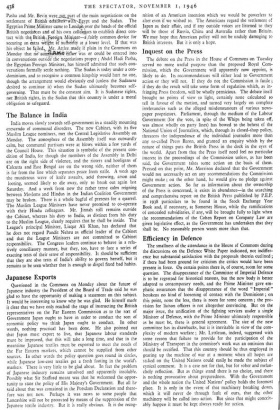Japanese Exports
Questioned in the Commons on Monday about the future of Japanese industry the President of the Board of Trade said he was glad to have the opportunity of making a statement on this subject. It would be interesting to know why he was glad. He himself made it clear that we have only reached the stage of instructing the British representatives on the Far Eastern Commission as to the sort of Government Japan ought to have in order to conduct the sort of economic policy we think Japan ought to conduct. In other words, nothing practical has been done. He also pointed out that Japan must export to live, that Japanese labour standards must be improved, that this will take a long time, and that in the meantime Japanese textiles must be exported to meet the needs of the Far Eastern markets, which cannot be supplied from other sources. In other words the policy question goes round in circles, while Japanese low-cost textiles get a fresh footing in the world's markets. There is very little to be glad about. In fact the problem of Japanese industry remains unsolved and apparently insoluble. Possibly what Sir Stafford meant was that he welcomed the oppor- tunity to state the policy of His Majesty's Government. But all he said about that was contained in the Potsdam Declaration and there- fore was not new. Perhaps it was news to some people that Lancashire will not be protected by means of the suppression of the Japanese textile industry. But it is really obvious. It is the recog- nition of an American intention which we would be powerless to alter even if we wished to. The Americans regard the settlement of Japan as their affair, and if any outside voices are listened to they will be those of Russia, China and Australia rather than Britain. We may hope that American policy will not be unduly damaging to British interests. But it is only a hope.


































 Previous page
Previous page